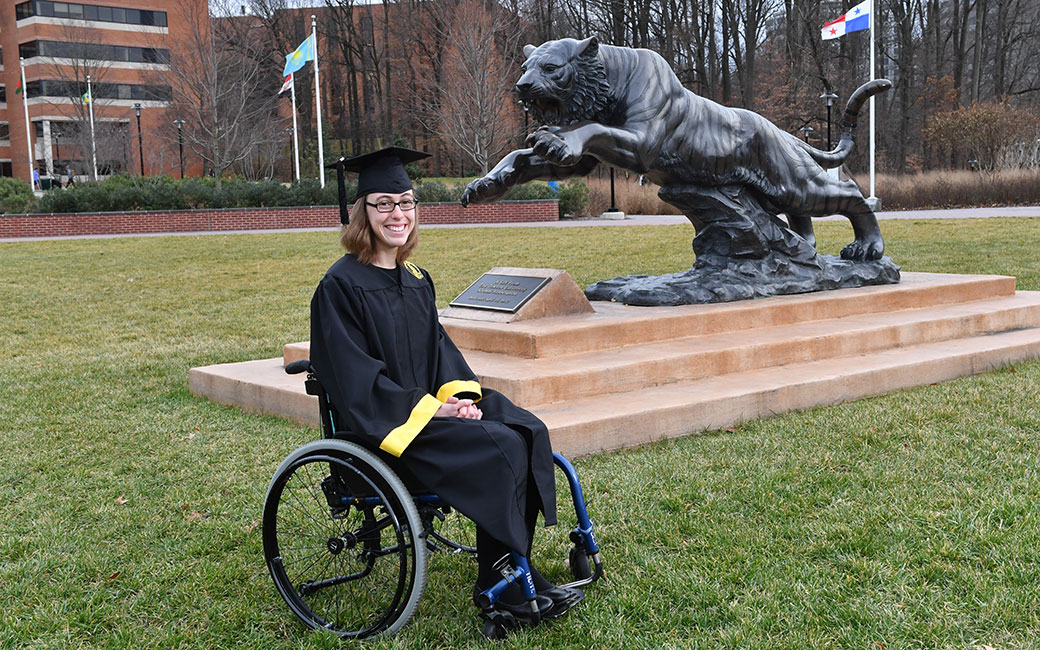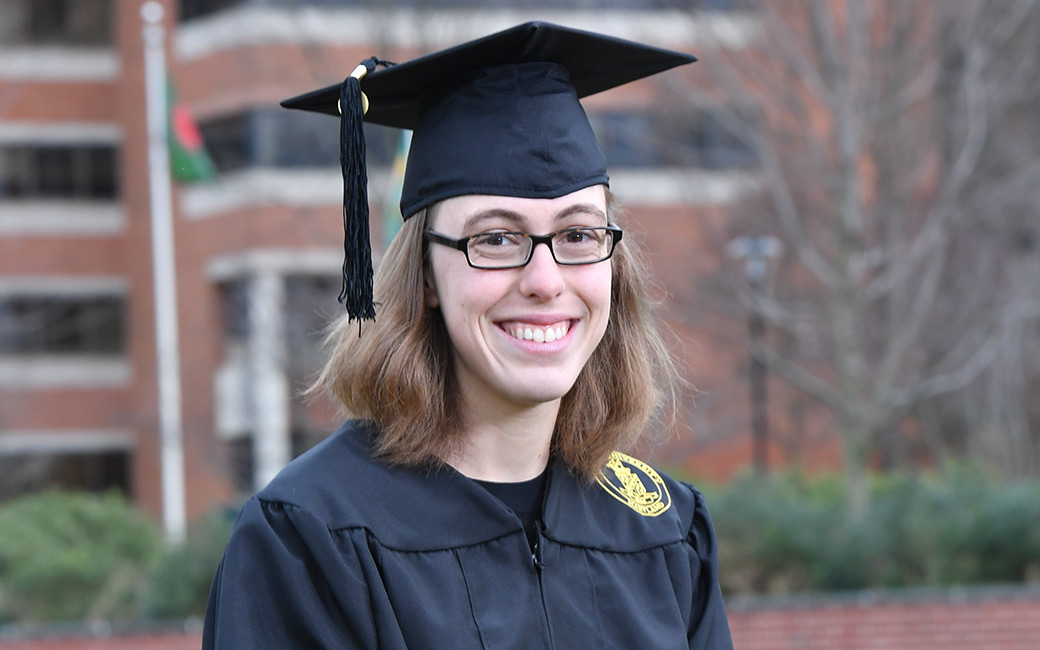
A passion for philanthropy
Family & Human Services graduate Amanda Carroll will join the Smithsonian's Archives of American Art fundraising department.
By Kelly Nagle on December 17, 2017

When Amanda Carroll receives her diploma on Dec. 20, 2017, it will be a momentous occasion. Not only is she graduating a semester early with a perfect 4.0 GPA — an accomplishment in itself — it will be the first time she has ever participated in a graduation ceremony.
Early in high school Carroll was diagnosed with mitochondrial disease, a life-threatening metabolic disorder that affects her body’s ability to convert food into energy.
During a time when life should be carefree, 14-year old Carroll no longer had the strength to attend school and started using a wheelchair. Her days participating in marching band and dreaming of becoming a ballerina were now filled with unexpected hospital visits and adjusting to new limitations.
“It was a really dark time,” recalled Carroll.
In the darkest moments, it was her love for learning and helping others that kept Carroll’s spirits up, pushing her in a positive direction. She continued her academics through Florida Virtual School and spent time volunteering at Nemours Children’s Hospital.
“It’s really school that brought me back and started the momentum in a positive direction,” Carroll said. “Getting my brain engaged helped me recover and find that drive. Even though my muscles didn’t work, I could still think, learn and grow. Things were still terrible medically, but it made me realize that maybe going away to college was still an option.”
Carroll calls TU her “goldilocks school”; everything was just right—the size, cost and accessibility. It also offered a family and human services major that aligned with her career goals.
“I just fell in love with Towson (University),” She said. “It’s accessible. Everybody I talked with was very open and welcoming. I knew this was somewhere that I needed to be.”
College is the obvious next step for many high school graduates, but for Carroll it was a new lease on life. Not only did she excel academically, she also found opportunities to get involved on campus — serving as secretary for the Child Life Club and Student Council on Family Relations. She also revisited her childhood hobby of creating newspapers by joining TU’s student newspaper The Towerlight as a contributing writer.
“Living with chronic illness and disabilities has really taught me to live in the moment, be present and recognize that you don’t always get a tomorrow,” Carroll said. “That has made me more willing to be out of my comfort zone and to seek out opportunities.”
TU’s Family and Human Services’ leadership in nonprofit track gave Carroll the opportunity to pursue her passion for philanthropy and gain experience both in and out of the classroom. Between nonprofit internships, service-learning classes and her own volunteer initiatives, Carroll has completed more than 500 service hours in the Baltimore-Washington metropolitan area.
The first nonprofit Carroll volunteered with was the Ronald McDonald House Charities of Baltimore. There was a personal connection because her family stayed at a Ronald McDonald House when she was receiving treatment in Florida. One of her favorite memories is organizing the Red Shoe Shuffle, an annual 5K event that raises money, and serves as an annual homecoming for families who have stayed at the facility.
“Volunteering for the Ronald McDonald House was such an awesome and cathartic way for me to get off campus and learn about Baltimore and reaffirmed my desire to pursue philanthropy,” she said.
Through service learning classes, Carroll had the opportunity to become better-rounded in her career path while helping the local community. A few examples of Carroll’s work included:
- Grant writing for the Boys & Girls Club of America
- Working with Volunteers of America to research recidivism at a half-way house in Baltimore City
- Providing marketing analysis for the Hunt Valley-based ALS organization Brigance Brigade
- Creating a live Kickstarter fundraising campaign for Safe Alternative Foundation for Education Inc., an after-school program in Baltimore City.
“With all of these different Baltimore nonprofits, I’ve gotten to learn about issues I never knew about and have a connection with the community that makes me a better nonprofit professional going into the field,” Carroll said. “I’ve had experience wearing multiple hats, which is required in the nonprofit world, so I really value all of those experiences, which shaped how I think about the sector.”
Carroll’s passion for philanthropy and serving has always been strong, but she says it was her experience as the Presidential Ambassador Program’s Philanthropy Committee Co-Chair that solidified her desire to become a nonprofit development professional. Selected through an application and interview process, the volunteer ambassadors educate other students on why TU needs their philanthropic support while they’re still in school.
“It was an awesome training ground for what has become my career,” she said. “Being able to stand in front of a room of people I don’t know and say this is why philanthropy matters and why I personally give back to Towson (University), that really gave me the confidence and vocabulary to have that development mindset.”
She credits her desire to become a global change agent to the mentors and professors who supported her along the way. When she talks about Family Services professor Bethany Willis Hepp, Ph.D., Carroll’s face lights up.
“Dr. Willis Hepp brought different theories to life and encouraged us to apply those theories to our professional framework,” Carroll said. “Identifying with different theories such as feminist theory or ecological systems theory helped me to recognize different ways I can impact the world by viewing the world through a variety of perspectives.”
Last week Carroll signed a lease on a studio apartment in Washington D.C. and will soon begin a fundraising job with the Smithsonian's Archives of American Art, the world’s largest and most widely used resource dedicated to collecting and preserving the papers and primary records of the visual arts in America. Her experience interning with the Smithsonian’s African Art Museum and the Baltimore Symphony Orchestra the past few years has given her a greater appreciation for the importance of cultural philanthropy. She says there is more to a physical piece of art than what meets the eye, it is more about the story each piece tells and its context in history.
“People want to know that they’re making a difference,” Carroll said. “I think that is fundamentally true of people. We want to make a difference in the world. Helping donors see their contribution is an investment, not a one-time transaction, that is why I love being a development professional in the nonprofit sector.”
When the College of Liberal Arts graduation commences next week, Carroll’s younger sister will push her as she leads the procession as student banner carrier. Her parents will also be there to watch their daughter achieve what they once believed wasn’t possible.
Asked how she feels about graduating, Carroll paused to reflect.
“Learning to live independently, jumping right into college after homeschooling to finish high school, it has been a lot of change,” she said after a deep breath. “But I’m very grateful for everyone along the way whose supported me or cheered me on because my success is their success. To think about where I’ve been and where I’m going, I’m really excited for the future, whatever it holds.”